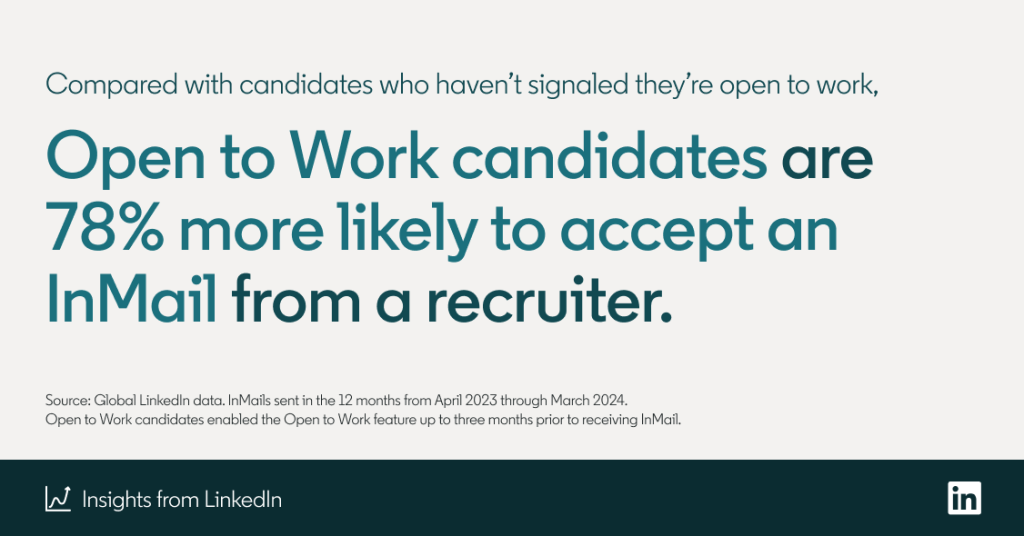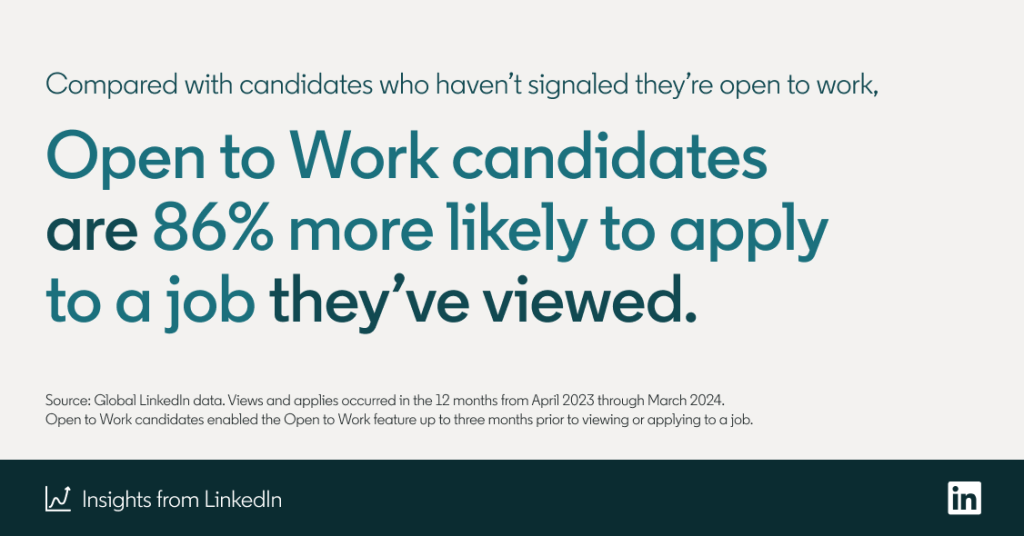
Sr. Content Marketing Manager @ LinkedIn | Data-driven storytelling, content strategy, and actionable insights
While we may be in the midst of the so-called Big Stay, it might not last for long: 85% of U.S. workers recently surveyed said they’re thinking about changing jobs in 2024.
How can talent professionals take advantage? Well, back in 2016, LinkedIn introduced a feature to let recruiters tap into this exact community — allowing members to raise their hand and silently signal to recruiters that they’re Open to Work.
Fast forward to 2024, and well over 100 million members around the world have currently enabled the Open to Work feature. Members can even use an #OpenToWork photo frame to let all LinkedIn members know, though that’s just a small portion of all Open to Work candidates — most choose to only let recruiters see their status.
The benefit for candidates is clear: Open to Work candidates are 2x more likely to hear from a recruiter. But new data suggests that recruiters could be doing more to tap into this talent pool — especially given the impact that this feature offers.
Read on to see just how big that impact can be, and why some recruiters may be overlooking this talent pool and leaving opportunities on the table.
This article is coauthored by senior insights analyst Adriana Zurbano.
Open to Work candidates are nearly twice as likely to accept an InMail and apply to a job
Hirers can find Open to Work candidates using a Spotlight filter applied to searches within LinkedIn Recruiter.

Why this matters for recruiters: Compared with candidates who haven’t signaled they’re open to work, candidates who have enabled the Open to Work feature within the last three months are 78% (or 1.8x) more likely to accept an InMail sent by a recruiter.
This is especially important for recruiting teams watching their available InMail credits. InMails that are accepted (or declined, but not ignored) earn recruiters their InMail credit back — in other words, recruiters are more likely to hear back from a higher rate of candidates, earning more credits back, which in turn allows them to ultimately reach more candidates in total and fill open roles faster.

Similarly, Open to Work candidates are 86% more likely to apply to a job post upon viewing it compared with candidates who haven’t signaled they’re open to work. That means it’s well worth targeting and engaging these candidates to point them to your job opening. By targeting them, you're actively engaging with a talent pool that is eager to seek out new opportunities.
Recruiters could be doing more with Open to Work candidates
Some recruiters may harbor misconceptions about Open to Work candidates, assuming they’re overly eager or potentially less qualified. Perhaps that’s why only 17% of all recruiter searches include an Open to Work filter. But those misconceptions are just that — misconceptions — and recruiters who overlook Open to Work candidates may be missing an easy opportunity to improve their reach and engagement.
In reality, Open to Work candidates aren’t a flood of underqualified applicants — they’re a valuable talent pool waiting to be tapped. With the Spotlight filter, you can actively find the most qualified members who also happen to be Open to Work — then you choose who is worth reaching out to.
Final thoughts
Open to Work candidates are almost twice as likely to accept your InMail and apply to your job posting — yet for many recruiters, they remain an underutilized resource.
If it’s been a while since you’ve used the Open to Work Spotlight filter, consider this your friendly reminder. It’s a simple way to significantly improve your candidate engagement.
Methodology
For this analysis, “Open to Work candidates” includes members who explicitly enrolled in Open to Work, whether enrollment was made visible to all members or recruiters only. InMails included in this analysis were sent in the last 12 months from April 2023 to March 2024. Open to Work candidates enrolled up to three months prior to receiving an InMail. Views and apply clicks for paid jobs occurred in the last 12 months from April 2023 to March 2024. Open to Work candidates enrolled up to three months prior to viewing or applying. LinkedIn Recruiter searches were performed in 2023; Open to Work searches are where the Spotlight filter for interested Open to Work candidates was applied.
Originally published on LinkedIn









